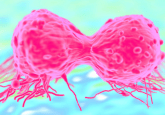Researchers discover new biomarker for head and neck squamous cell carcinoma

A comprehensive analysis of the molecular and clinical features of head and neck squamous cell carcinoma (HNSCC) that govern patient survival has revealed that the deleterious health effects of the mutated TP53 gene may be largely due to other genetic abnormalities.
TP53 plays a key role in regulating cell growth, detecting and fixing DNA, and directing cell apoptosis. As such, the TP53 protein is widely referred to as the ‘guardian of the genome’.
The study, which was conducted by scientists from the University of California (CA, USA), the University of Pittsburgh (PA, USA) and the University of North Carolina at Chapel Hill (NC, USA), discovered that mutation of this gene frequently occurs in tandem with a loss of chromosome 3p and that the combination of these events is associated with a noticeable decrease in patient survival time. The team further found that the TP53–3p event is modified by mir-548k expression, which also decreases survival and is mutually exclusive with mutations affecting RAS signaling.
The group anticipates that this discovery may form the basis of more personalized treatment for patients suffering with HNSCC. For example, the tumor could be tested for both the TP53 mutation and the 3p deletion, and if both of the two genetic identifiers are present, the patient’s treatment may be intensified accordingly.
If, however, only the TP53 mutation is present, the patient’s treatment could be reduced, since this genetic change is potentially less deadly than previously thought.
Associate Professor at the University of California and collaborator on the study, Quyen Nguyen, commented: “In the past, treatments for HNSCC have been based largely on the size and location of the tumor. Now, we know that some large tumors may respond to less aggressive treatment while some small tumors may need intensified treatment. This will have a huge impact for patients.”
Source: Gross AM, Orosco RK, Shen JP et al. Multi-tiered genomic analysis of head and neck cancer ties TP53 mutation to 3p loss. Nat. Genet. 46(9), 939–43 (2014).



